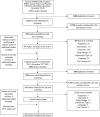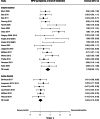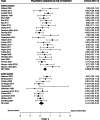Effectiveness of outpatient and community treatments for people with a diagnosis of 'personality disorder': systematic review and meta-analysis
- PMID: 36681805
- PMCID: PMC9862782
- DOI: 10.1186/s12888-022-04483-0
Effectiveness of outpatient and community treatments for people with a diagnosis of 'personality disorder': systematic review and meta-analysis
Abstract
Background: Quality of care and access to effective interventions have been widely criticised as limited for people diagnosed with 'personality disorder' or who have comparable needs (described in some recent papers as "Complex Emotional Needs" (CEN). It is important to identify effective interventions and the optimal context and mode of delivery for people with CEN. We aimed to investigate the effectiveness of psychosocial interventions delivered in community and outpatient settings in treating symptoms associated with 'personality disorder', and the moderating effects of treatment-related variables.
Methods: We systematically searched MEDLINE, EMBASE, PsycINFO, CINAHL, HMIC, ASSIA for articles published in English, from inception to November 23, 2020. We included randomized controlled trials examining interventions provided in community or outpatient settings for CEN. The primary outcome was 'personality disorder' symptoms, while secondary outcomes included anxiety symptoms, depressive symptoms, and global psychiatric symptoms. Random-effects meta-analysis was conducted for each outcome, and meta-regression analysis was performed to assess the moderating effects of treatment characteristics. The quality of the studies and the degree of publication bias was assessed.
Results: We included 54 trials (n = 3716 participants) in the meta-analysis. We found a large effect size (g = 0.78, 95% CI: 0.56 to 1.01, p < 0.0001) favoring interventions for 'borderline personality disorder' (BPD) symptoms over Treatment as Usual or Waitlist (TAU/WL), and the efficacy was maintained at follow-up (g = 1.01, 95% CI: 0.37 to 1.65, p = 0.002). Interventions effectively reduced anxiety symptoms (g = 0.58, 95% CI: 0.21 to 0.95, p = 0.002), depressive symptoms (g = 0.57, 95% CI: 0.32 to 0.83, p < 0.0001), and global psychiatric symptoms (g = 0.50, 95% CI: 0.35 to 0.66, p < 0.0001) compared to TAU/WL. The intervention types were equally effective in treating all symptom categories assessed. Treatment duration and treatment intensity did not moderate the effectiveness of the interventions for any outcome.
Conclusions: People with a 'personality disorder' diagnosis benefited from psychological and psychosocial interventions delivered in community or outpatient settings, with all therapeutic approaches showing similar effectiveness. Mental health services should provide people with CEN with specialised treatments in accordance with the availability and the patients' preferences.
Keywords: Community treatments; Personality disorder; Psychological interventions; Psychotherapy; Systematic review; meta-analysis.
© 2023. The Author(s).
Conflict of interest statement
The authors declare that they have no competing interests.
Figures




Similar articles
-
Interventions for adults with a history of complex traumatic events: the INCiTE mixed-methods systematic review.Health Technol Assess. 2020 Sep;24(43):1-312. doi: 10.3310/hta24430. Health Technol Assess. 2020. PMID: 32924926 Free PMC article.
-
Behavioural modification interventions for medically unexplained symptoms in primary care: systematic reviews and economic evaluation.Health Technol Assess. 2020 Sep;24(46):1-490. doi: 10.3310/hta24460. Health Technol Assess. 2020. PMID: 32975190 Free PMC article.
-
Systematic reviews of the effectiveness of day care for people with severe mental disorders: (1) acute day hospital versus admission; (2) vocational rehabilitation; (3) day hospital versus outpatient care.Health Technol Assess. 2001;5(21):1-75. doi: 10.3310/hta5210. Health Technol Assess. 2001. PMID: 11532238 Review.
-
Psychological interventions to improve self-management of type 1 and type 2 diabetes: a systematic review.Health Technol Assess. 2020 Jun;24(28):1-232. doi: 10.3310/hta24280. Health Technol Assess. 2020. PMID: 32568666 Free PMC article.
-
Telephone interventions for symptom management in adults with cancer.Cochrane Database Syst Rev. 2020 Jun 2;6(6):CD007568. doi: 10.1002/14651858.CD007568.pub2. Cochrane Database Syst Rev. 2020. PMID: 32483832 Free PMC article.
Cited by
-
Salivary testosterone and cortisol levels in borderline personality disorder before and after a 12-week group dialectical behavior therapy intervention.Front Psychol. 2023 Jul 17;14:1195187. doi: 10.3389/fpsyg.2023.1195187. eCollection 2023. Front Psychol. 2023. PMID: 37529315 Free PMC article.
-
Subtyping Service Receipt in Personality Disorder Services in South London: Observational Validation Study Using Latent Profile Analysis.Interact J Med Res. 2025 Apr 15;14:e55348. doi: 10.2196/55348. Interact J Med Res. 2025. PMID: 40233345 Free PMC article.
-
Long-Term Improvements of Complex Post-Traumatic Stress Disorder (CPTSD) Symptoms After Multimodal Psychodynamic Inpatient Rehabilitation Treatment-An Observational Single Center Pilot Study.J Clin Psychol. 2025 Aug;81(8):739-754. doi: 10.1002/jclp.23809. Epub 2025 May 12. J Clin Psychol. 2025. PMID: 40353723 Free PMC article.
References
-
- American Psychiatric Association . Diagnostic and statistical manual of mental disorders: Dsm-5. Washington, D.C.: American Psychiatric Publishing; 2013. p. 645.
-
- Sheridan Rains L, Echave A, Rees J, Scott HR, Lever Taylor B, Broeckelmann E, Steare T, Barnett P, Cooper C, Jeynes T, Russell J. Service user experiences of community services for complex emotional needs: a qualitative thematic synthesis. PLoS One. 2021;16:e0248316. doi: 10.1371/journal.pone.0248316. - DOI - PMC - PubMed
Publication types
MeSH terms
Grants and funding
LinkOut - more resources
Full Text Sources

